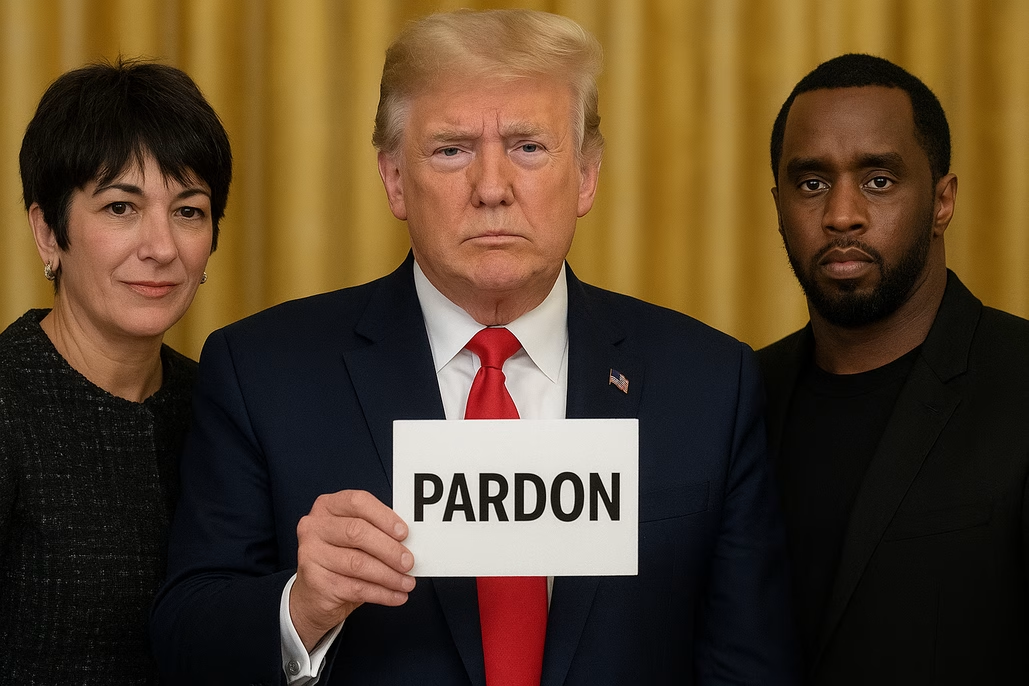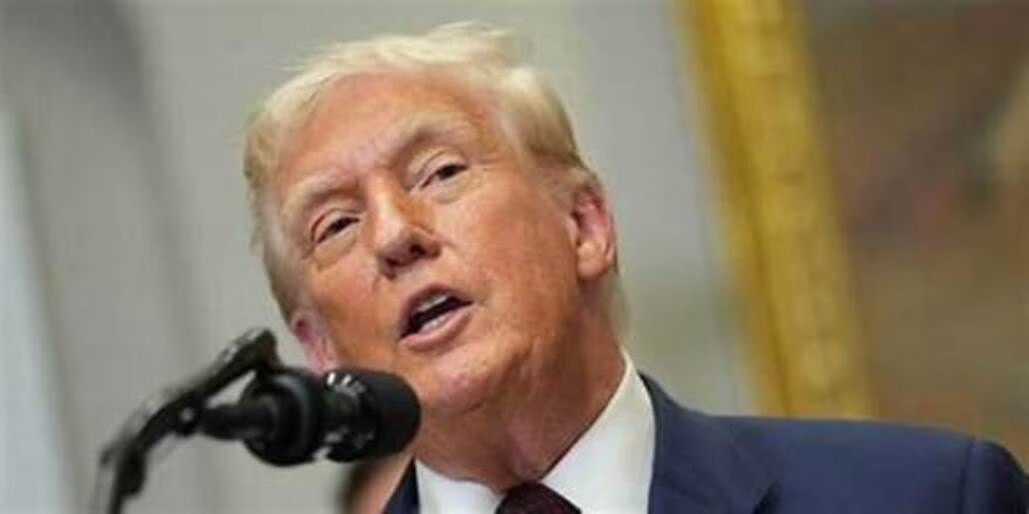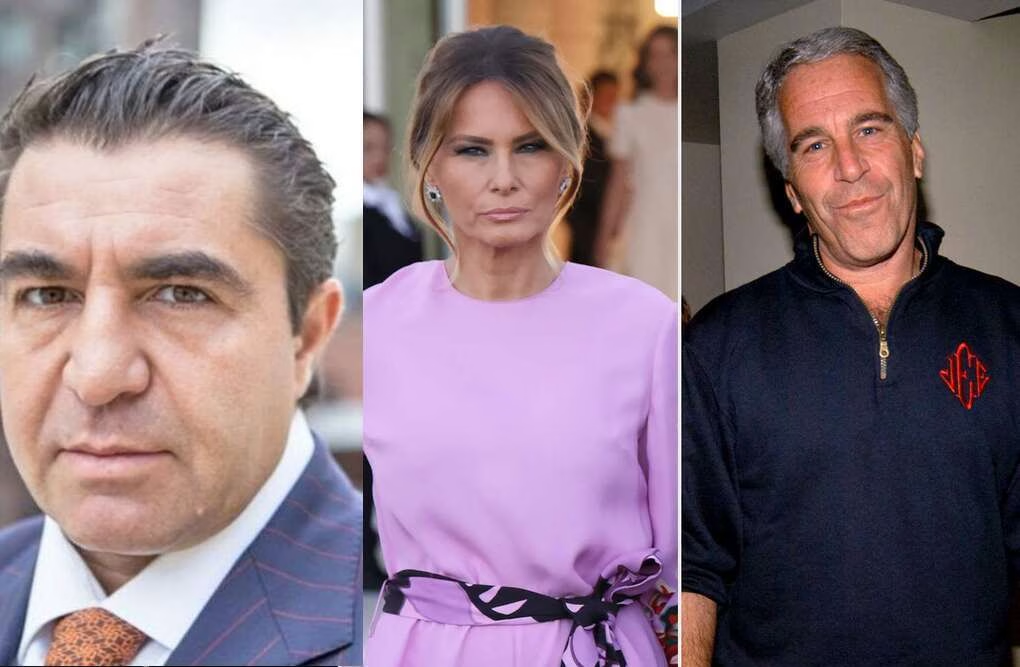By Don Terry | Saturday, October 11, 2025 | 8 min read
The question hung in the air like a spark waiting to catch: Could Donald Trump actually pardon Ghislaine Maxwell or Sean “Diddy” Combs?
It began with a single exchange inside the Oval Office. After the U.S. Supreme Court rejected Ghislaine Maxwell’s appeal to overturn her sex trafficking conviction tied to Jeffrey Epstein, CNN’s Kaitlan Collins asked President Trump whether he would consider a pardon for the British socialite. Trump leaned back, appearing caught slightly off guard.
“I’d have to talk to the DOJ,” he replied. “I haven’t heard that name in a long time. We’ll take a look at it.”
Almost in the same breath, Trump mentioned that music mogul Sean “Diddy” Combs had also sent him a formal pardon request.
The remarks set off a storm of reactions—swift, emotional, and politically explosive.
A Remark That Sparked Outrage
For many Americans, the idea of extending clemency to Maxwell felt like a slap in the face. She had been convicted of enabling Jeffrey Epstein’s vast sex trafficking network—an operation that victimized young girls and left lasting scars on countless lives. The Supreme Court’s refusal to hear her appeal effectively cemented her 20-year prison sentence.
“She was convicted of basically running a sex trafficking ring,” said Sky Roberts, brother of Epstein survivor Virginia Giuffre. “What message does it send to our children, to everyone, if someone like that is pardoned?”
Even some within Trump’s own MAGA base expressed discomfort with the idea. For a movement built on law-and-order rhetoric, offering a second chance to one of the most reviled figures in recent memory could be politically dangerous.
Trump’s Calculated Ambiguity
But Trump didn’t say yes. He didn’t say no either. And that’s precisely what some political observers believe was intentional.
“Trump doesn’t like to be boxed in, and he especially doesn’t like to box himself in,” said Stanley Renshon, a political science professor at the City University of New York and a certified psychoanalyst. “Maximum flexibility is Trump’s presidential North Star, and this is a good illustration of it.”
Renshon argued that Trump’s vague language—particularly when speaking to CNN, a network he’s spent years vilifying—was a strategic move. By keeping his answer open-ended, Trump preserves political leverage. If he wants to rally his base by appearing tough on crime, he can. If he wants to cast himself as a “merciful” leader down the line, that door remains open too.
“This is a man who learned from his first term,” Renshon added. “He doesn’t like getting cornered, especially by the media or his opponents.”
A History of Controversial Pardons
Trump has never shied away from using the pardon power broadly—and, at times, controversially. During his previous term, he issued clemency to reality TV stars Todd and Julie Chrisley, Silk Road founder Ross Ulbricht, and dozens of political allies.
Perhaps the most divisive moment came when he pardoned roughly 1,500 individuals tied to the January 6 Capitol riot. He framed the mass pardons as “a step toward national healing,” but the move deeply polarized the country. A Reuters/Ipsos poll found that 58% of Americans disapproved of those pardons, while just 23% supported them.
That history matters now. It shows Trump is willing to defy public opinion when he believes it benefits his political narrative—or bolsters his base.
Ghislaine Maxwell’s Legal Dead End
For Maxwell, the Supreme Court’s rejection of her appeal effectively ended her legal options. Her lawyers had argued that a 2007 non-prosecution agreement, negotiated between Epstein’s attorneys and federal prosecutors, should have shielded her from later charges. The high court disagreed, leaving her 20-year sentence intact.
This means any real hope for release would have to come through executive clemency—a pardon or commutation from the president. And for now, Trump isn’t ruling it out.
His relationship with the Epstein saga has always been complicated. He once moved in the same Palm Beach social circles as Epstein, then later publicly distanced himself. In 2020, when Maxwell was arrested, Trump infamously said, “I just wish her well.” He repeated the sentiment in a later interview, adding, “I wish a lot of people well.”
A Different Case: Sean “Diddy” Combs
The situation with Sean “Diddy” Combs is markedly different but equally fraught. Combs, facing serious federal charges, has petitioned for clemency ahead of sentencing.
Trump and Combs go way back. In the late 1990s and early 2000s, they were often photographed together at glamorous New York events. Trump once called Combs a “good guy” and “a good friend.” But their friendship soured during the 2020 campaign, when Combs criticized Trump publicly and endorsed Joe Biden.
“I was very friendly with him. I got along with him great,” Trump told Newsmax recently. “But when I ran for office, he was very hostile. It makes it more difficult to do.”
Pressed on whether that meant a pardon was off the table, Trump replied, “I would say so.”
Combs’ legal team is currently pushing for him to be placed at FCI Fort Dix, a low-security federal prison in New Jersey, where he could participate in a drug treatment program. Whether Trump would intervene remains uncertain—but his tone suggests it’s unlikely.
Politics Over Principle
Trump’s approach to both Maxwell and Combs underscores a larger pattern: his use of presidential powers not just as legal tools, but as political weapons. Pardons are leverage. They can send messages, solidify loyalty, or rally a base.
Whether he ultimately acts is almost secondary to the spectacle itself. By staying vague, he fuels speculation, keeps his name in headlines, and maintains control over the narrative.
“He loves being the decider,” Renshon said. “It’s less about justice and more about power.”
The Road Ahead
For Ghislaine Maxwell, a pardon remains a remote but not impossible scenario. For Diddy, personal history may complicate his chances. But in both cases, Trump’s careful ambiguity is the real story.
In a political landscape where spectacle often outweighs substance, a noncommittal “we’ll take a look at it” is enough to ignite a national debate.
Whether Trump ever signs those pardons or not, the fact that these conversations are happening at all is a stark reminder of how much weight presidential power carries—and how one man’s decision can upend the lives of millions.
In the end, the question isn’t just whether Donald Trump can pardon Ghislaine Maxwell or Sean “Diddy” Combs — it’s whether he should. Presidential pardons have always carried political consequences, but in this case, the stakes are uniquely high. A pardon for either figure would almost certainly ignite a cultural and political firestorm, testing Trump’s relationship with his base and reshaping the narrative around his presidency.
For many of his supporters, Trump’s appeal lies in his promise to champion “law and order” and stand apart from what they see as the corrupt elite. Extending clemency to Maxwell — a woman convicted in connection to one of the most notorious sex trafficking scandals of the century — or to Combs, who faces serious allegations, would run counter to that image. Even for a politician who thrives on controversy, the backlash could be explosive.
Yet Trump has built his political career on unpredictable moves and defying expectations. By keeping his options open, he maintains leverage and dominates the conversation. Whether he ultimately grants a pardon or not, the mere suggestion ensures he remains at the center of the storm.
But this time, the gamble could be different. A misstep on an issue this charged doesn’t just risk a news cycle — it risks alienating the very base that has stood by him through countless scandals. As the 2025 political landscape grows more volatile, Trump may find that a single decision could determine whether his loyal following remains steadfast or begins to fracture.
Tesla Seeks Green Light from Shareholders on Massive $8.5 Trillion Musk Pay Package
American Democracy Is on Life Support — and Trump, the GOP, and DOJ Pulled the Plug
Trump Administration To Target All 55 Million U.S. Visa Holders For Potential Violations
‘Lord of the Sea’? Trump’s New War Declaration Exposes a Chilling Mix of Power and Delusion
Pope Leo XIV: You Can’t Be ‘Pro-Life’ and Support the Death Penalty or Cruelty Toward Immigrants





